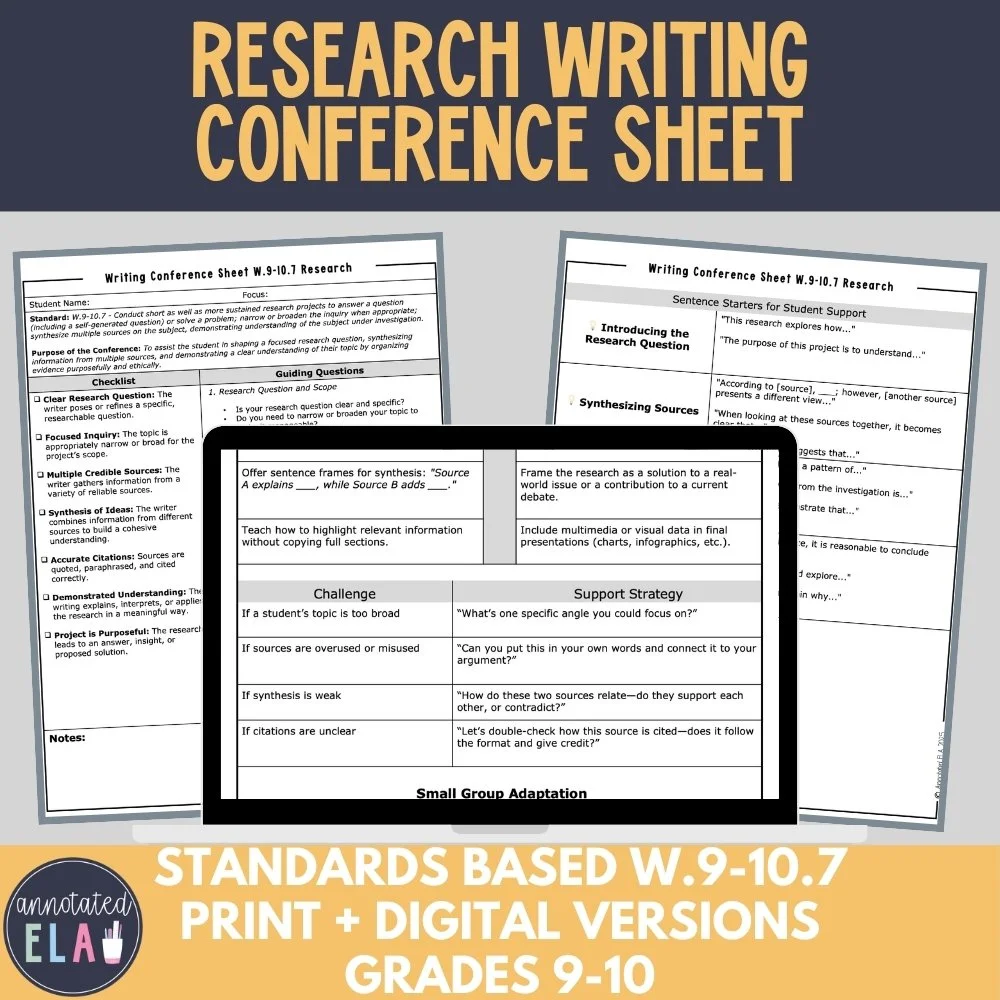 Image 1 of 5
Image 1 of 5

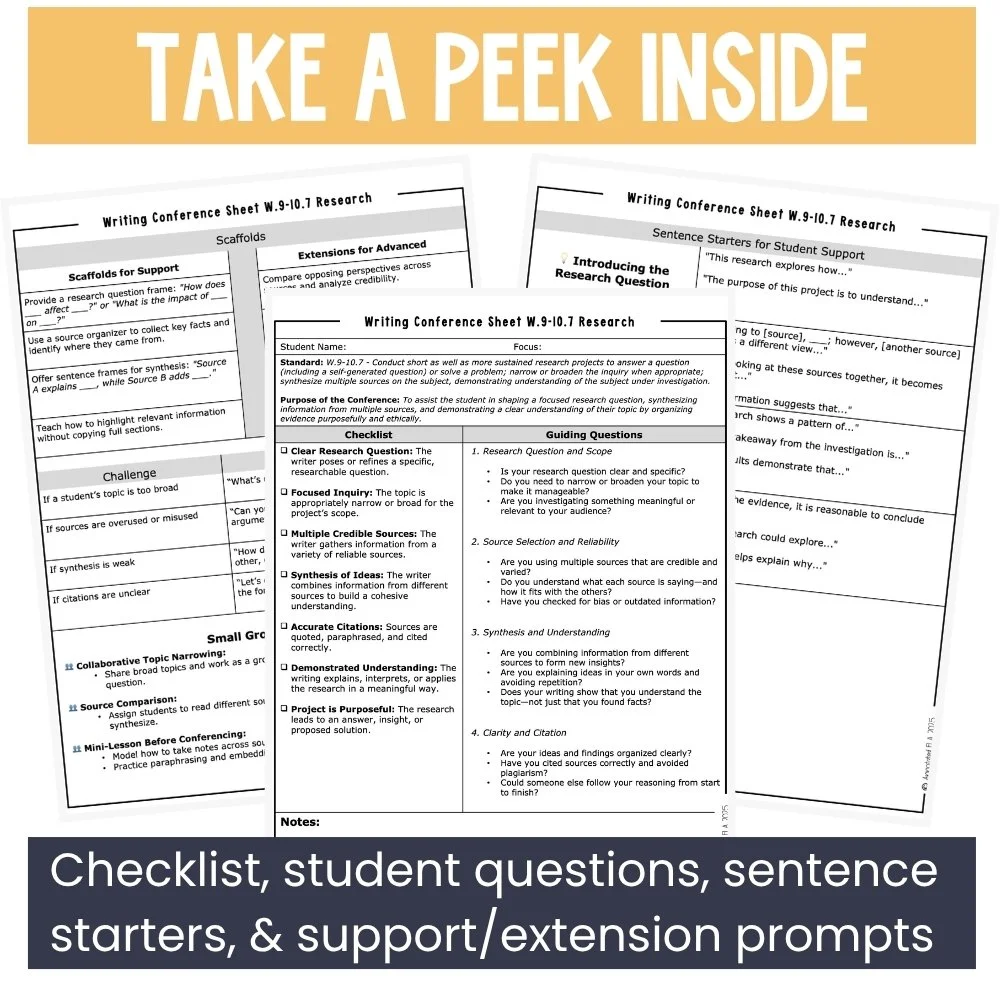 Image 2 of 5
Image 2 of 5

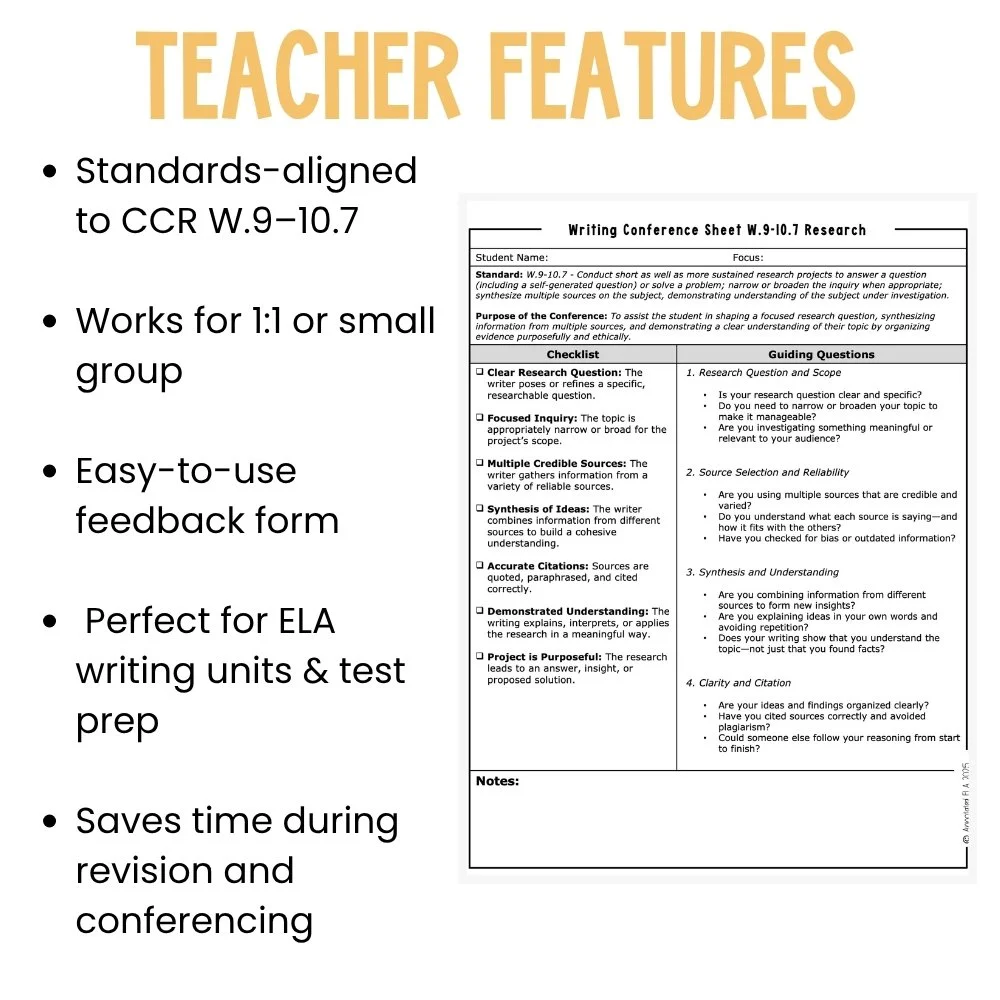 Image 3 of 5
Image 3 of 5

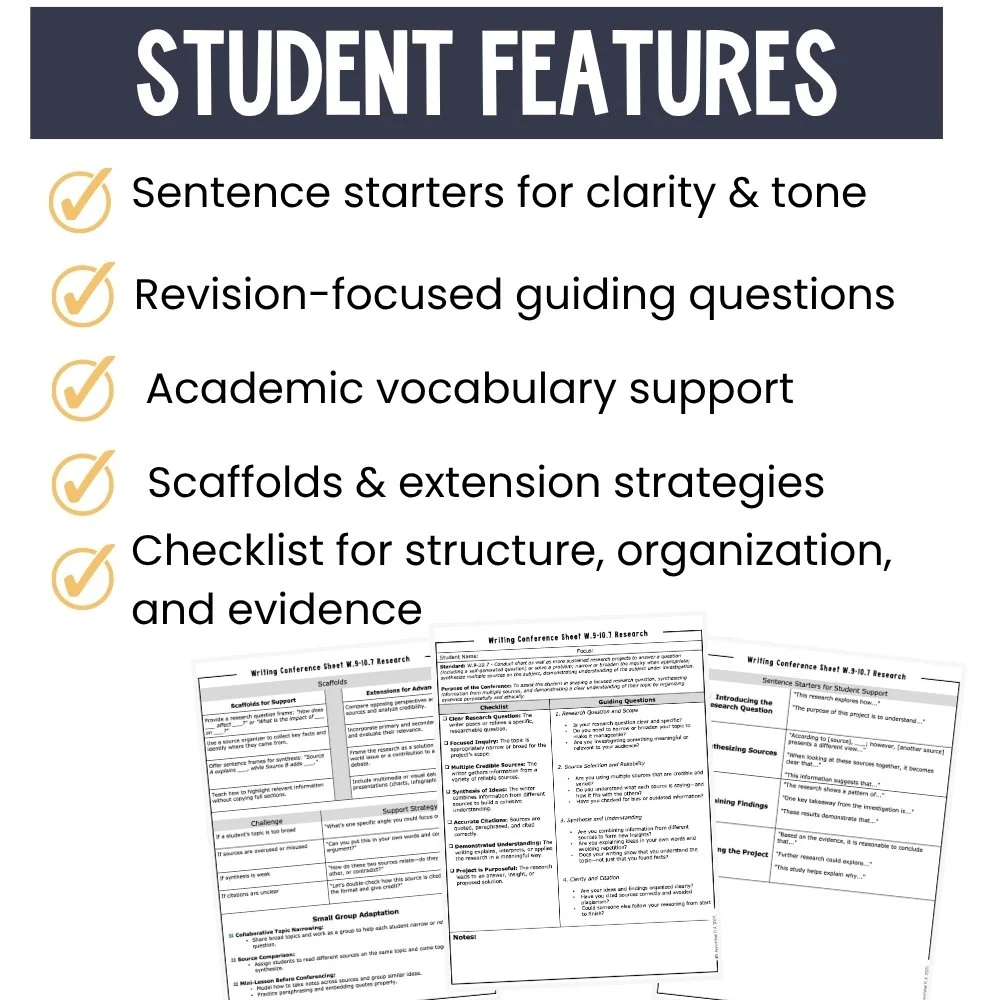 Image 4 of 5
Image 4 of 5

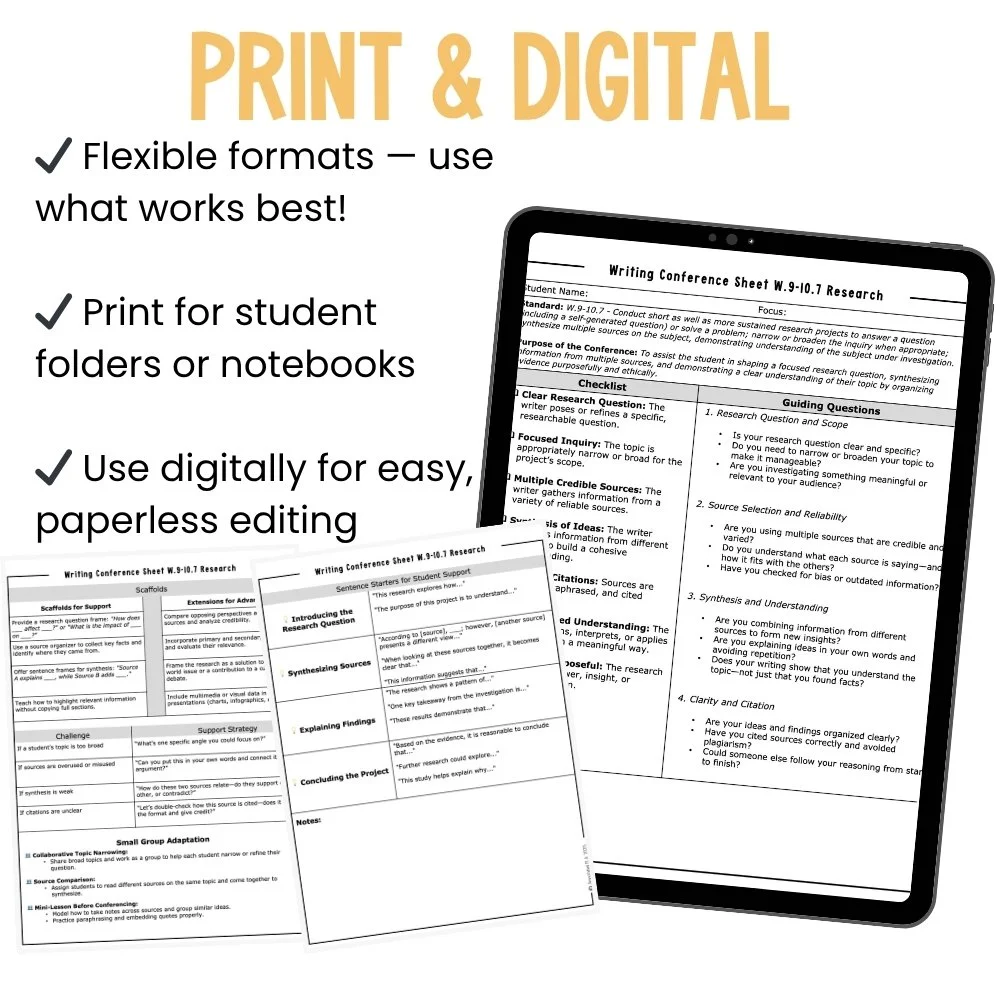 Image 5 of 5
Image 5 of 5






High School Writing Conference Sheet | W.9–10.7 Research & Synthesis Tool
Take the stress out of research writing, and set your high schoolers up for research success with this easy-to-use, W.9–10.7-aligned conference sheet.
Designed for Grades 9–10, this writing conference tool for research writing supports students through the entire research process—from refining their question to synthesizing sources and organizing their findings.
Whether you're facilitating one-on-one writing conferences, peer research check-ins, or small group writing revision sessions, this resource offers the scaffolds students need to conduct research, think critically, and write purposefully.
Students learn how to narrow their inquiry, evaluate and integrate multiple sources, and demonstrate deep understanding—all while receiving targeted guidance at every stage of their project.
✅ What’s Included:
Editable Writing Conference Sheet (PDF + Google Doc™) Use in print or digitally for seamless integration into your research writing instruction.
Student-Friendly Checklist Aligned to W.9–10.7 Guides students through the research process: forming questions, evaluating sources, synthesizing ideas, and presenting meaningful findings.
Conference Guiding Questions for Teachers Help students develop researchable questions, compare perspectives, and reflect on purpose, structure, and synthesis.
Sentence Starters for Research & Synthesis This secondary ELA research writing support tool includes academic sentence stems to help students explain findings and integrate source material clearly.
Challenge Prompts & Strategy Box Includes common revision strategies for unclear focus, overuse of quotations, weak synthesis, and citation errors.
Built-In Scaffolds & Extensions From revision stems for student writing to advanced synthesis challenges, this tool supports all learners as they grow into confident researchers.
Small Group Adaptation Ideas Includes strategies for collaborative topic narrowing, source comparison, and pre-conference mini-lessons.
Key Benefits:
You get full alignment to W.9–10.7, so you can support every stage of the research process—confident that your conferences stay on target.
You get a structured, research-specific checklist, so students understand what makes strong, ethical, and effective research writing.
You get sentence starters and synthesis supports, so students can revise source integration and analysis—not just surface-level edits.
You get print and digital options, so this tool fits easily into notebooks, Google Classroom, or research writing folders.
You get a low-prep, high-impact solution, so your writing conferences are consistent, focused, and standards-based—without extra planning.
✍️ Use This Resource To:
Guide structured student or teacher-led research conferences
Support students in narrowing inquiry and synthesizing information
Build source evaluation and citation skills
Provide intentional, consistent research paper support for high school
Reinforce standards-aligned writing habits for research projects
Strengthen independent research thinking and writing fluency
Perfect For:
Research paper units and projects
Peer conferencing and collaborative inquiry
Small group writing revision sessions
Independent research checkpoints
High school ELA classrooms
Any genre requiring synthesis of multiple sources
Suggested Uses:
Mid-project check-ins with the high school research writing conference sheet
Peer reviews using research-focused guiding questions
Teacher-led feedback sessions on narrowing topics or building synthesis
Citation and paraphrasing stations in research writing units
Reflection on credible source use and research insights
Use as a conference tool, graphic organizer, or research paper support guide for high school students
Whether students are writing a formal research paper or conducting a short investigation, this tool gives them the structure to ask better questions, synthesize sources, and present findings with clarity—while giving teachers a ready-to-go tool for meaningful writing conferences.
Take the stress out of research writing, and set your high schoolers up for research success with this easy-to-use, W.9–10.7-aligned conference sheet.
Designed for Grades 9–10, this writing conference tool for research writing supports students through the entire research process—from refining their question to synthesizing sources and organizing their findings.
Whether you're facilitating one-on-one writing conferences, peer research check-ins, or small group writing revision sessions, this resource offers the scaffolds students need to conduct research, think critically, and write purposefully.
Students learn how to narrow their inquiry, evaluate and integrate multiple sources, and demonstrate deep understanding—all while receiving targeted guidance at every stage of their project.
✅ What’s Included:
Editable Writing Conference Sheet (PDF + Google Doc™) Use in print or digitally for seamless integration into your research writing instruction.
Student-Friendly Checklist Aligned to W.9–10.7 Guides students through the research process: forming questions, evaluating sources, synthesizing ideas, and presenting meaningful findings.
Conference Guiding Questions for Teachers Help students develop researchable questions, compare perspectives, and reflect on purpose, structure, and synthesis.
Sentence Starters for Research & Synthesis This secondary ELA research writing support tool includes academic sentence stems to help students explain findings and integrate source material clearly.
Challenge Prompts & Strategy Box Includes common revision strategies for unclear focus, overuse of quotations, weak synthesis, and citation errors.
Built-In Scaffolds & Extensions From revision stems for student writing to advanced synthesis challenges, this tool supports all learners as they grow into confident researchers.
Small Group Adaptation Ideas Includes strategies for collaborative topic narrowing, source comparison, and pre-conference mini-lessons.
Key Benefits:
You get full alignment to W.9–10.7, so you can support every stage of the research process—confident that your conferences stay on target.
You get a structured, research-specific checklist, so students understand what makes strong, ethical, and effective research writing.
You get sentence starters and synthesis supports, so students can revise source integration and analysis—not just surface-level edits.
You get print and digital options, so this tool fits easily into notebooks, Google Classroom, or research writing folders.
You get a low-prep, high-impact solution, so your writing conferences are consistent, focused, and standards-based—without extra planning.
✍️ Use This Resource To:
Guide structured student or teacher-led research conferences
Support students in narrowing inquiry and synthesizing information
Build source evaluation and citation skills
Provide intentional, consistent research paper support for high school
Reinforce standards-aligned writing habits for research projects
Strengthen independent research thinking and writing fluency
Perfect For:
Research paper units and projects
Peer conferencing and collaborative inquiry
Small group writing revision sessions
Independent research checkpoints
High school ELA classrooms
Any genre requiring synthesis of multiple sources
Suggested Uses:
Mid-project check-ins with the high school research writing conference sheet
Peer reviews using research-focused guiding questions
Teacher-led feedback sessions on narrowing topics or building synthesis
Citation and paraphrasing stations in research writing units
Reflection on credible source use and research insights
Use as a conference tool, graphic organizer, or research paper support guide for high school students
Whether students are writing a formal research paper or conducting a short investigation, this tool gives them the structure to ask better questions, synthesize sources, and present findings with clarity—while giving teachers a ready-to-go tool for meaningful writing conferences.
